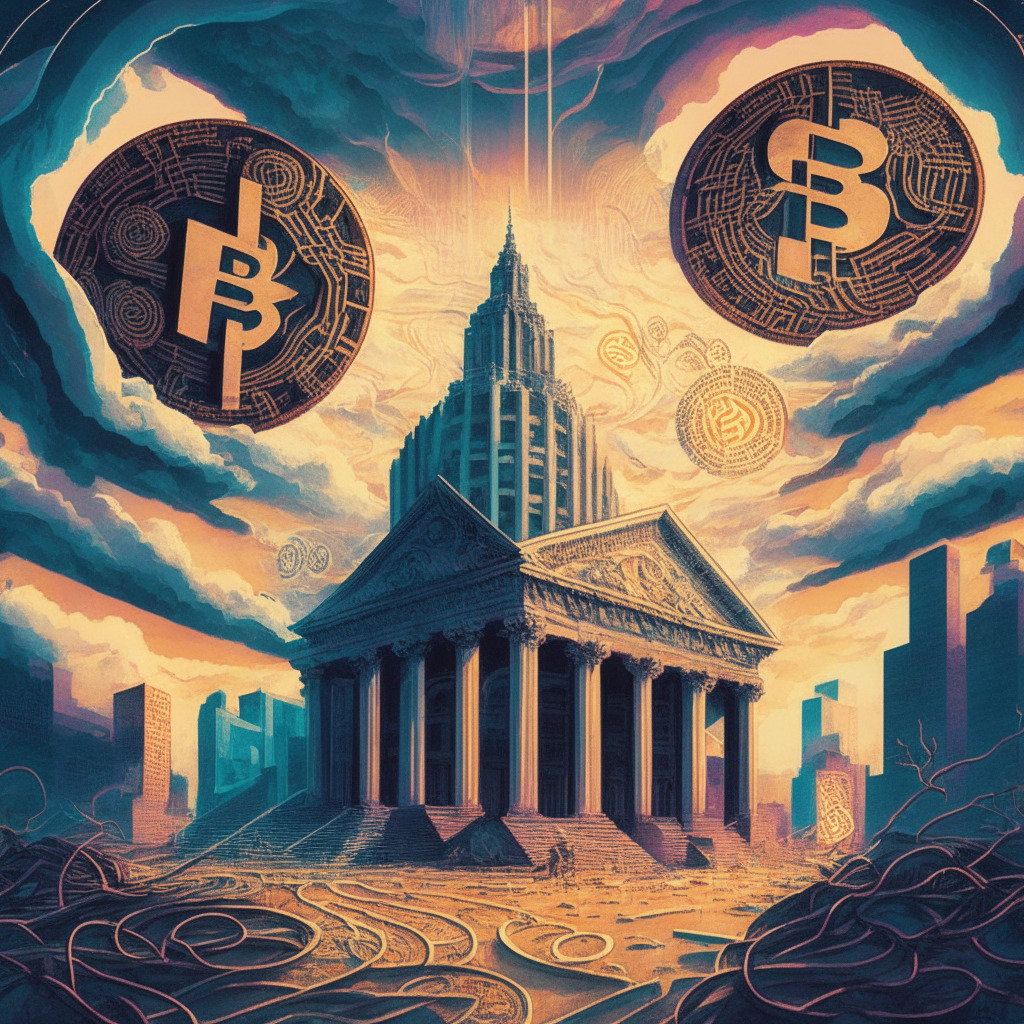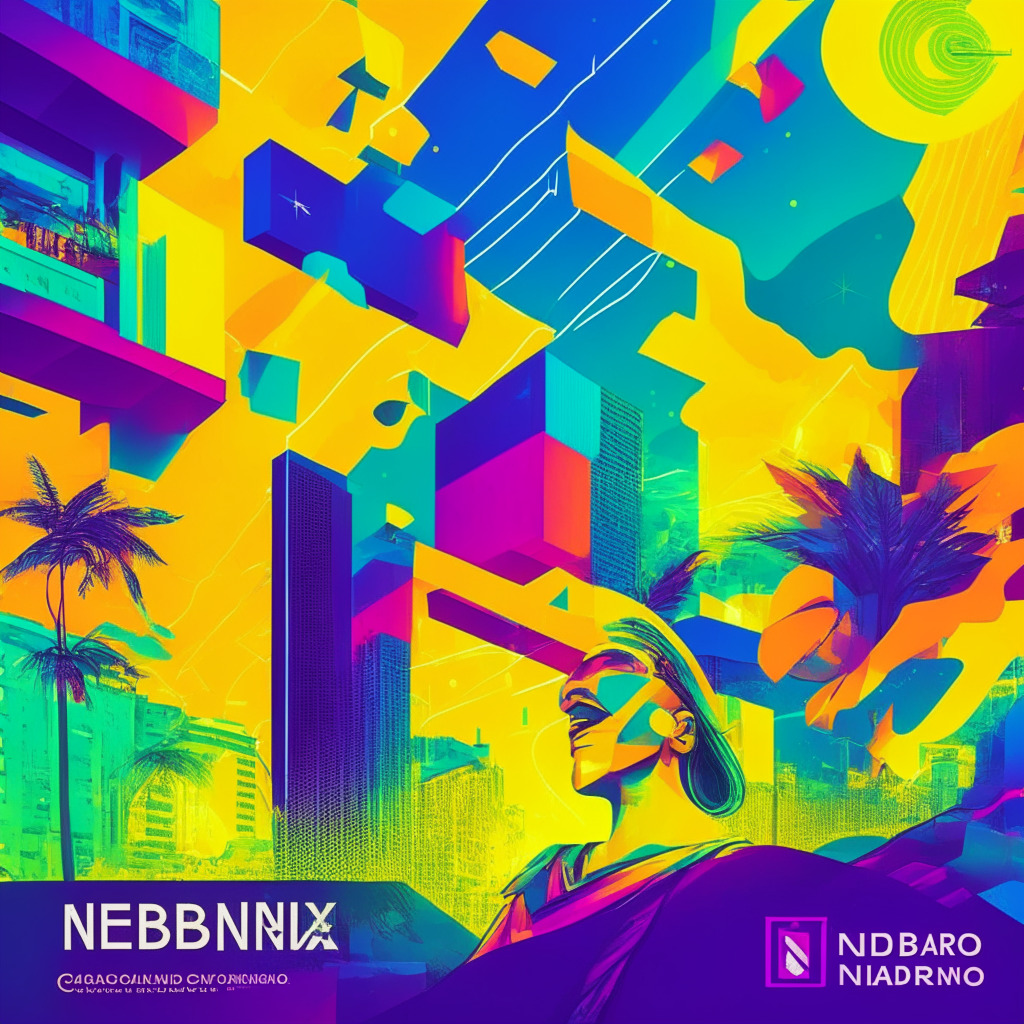“IBM Consulting offers insights on the successful implementation of a digital euro, emphasizing simplicity for initial adoption, integrating payment intermediaries’ needs, standardizing APIs for seamless integration, and valuing blockchain’s significant benefits. Resilience, transparency, security, and regulatory clarity are the key concerns for an increasingly digital economy.”
Search Results for: distributed ledger technology
Shackles or Safeguards? Federal Reserve’s Crypto Oversight Fuels Global Expansion
The Federal Reserve’s intensified scrutiny of banks’ cryptocurrency activities has sparked criticism from Republican lawmakers who argue this deters institutions from participating in the digital asset landscape. The Fed’s new requirements may potentially suppress the progress of decentralized finance. Amidst this, U.S. regulations on digital assets remain unclear, pushing some crypto companies to explore alternative markets overseas. The discourse focuses on balancing effective supervision with fostering blockchain innovation.
Federal Reserve’s Tightened Grip on Crypto Sparks Republican Lawmakers’ Concerns
Republican lawmakers express concerns over the Federal Reserve’s intensified oversight on crypto and stablecoin activities, arguing it might block the progress of a legislative proposal aimed at regulating stablecoins. Lawmakers believe the increased scrutiny might dissuade financial institutions from entering the digital asset ecosystem.
Unraveling the IRS Draft on Digital Asset Reporting: A Regulatory Leap or Misguided Move?
The US IRS has issued draft guidelines on reporting rules for digital asset brokers. Aimed at regulating the digital asset industry, this regulation intends to streamline tax reporting and prevent fraud, proposing to raise $28 billion in fresh tax over a decade. Critics label it as “misguided” and “an attack on the digital asset ecosystem.”
EU’s Data Act: A Double-Edged Sword for Blockchain and DeFi?
The European Union’s Data Act introduces regulations that could reshape the digital landscape, causing concern among blockchain experts due to provisions like a “kill switch” for smart contracts. This could have unforeseen consequences due to a lack of clarity on safe termination conditions, creating uncertainty in the world of blockchain and decentralized finance (DeFi).
Brazil’s CBDC ‘Drex’: Triumph in Banking or Gateway to Central Authority Meddling?
“Brazil’s Central Bank recently introduced its central bank digital currency, Drex. However, concerns are raised by the currency’s potential for central authority interference, alongside questions about the movement of assets of popular cryptos following the collapse of Silvergate Bank. Advocates, meanwhile, hail the currency’s potential to improve Brazil’s banking sector.”
Alien Influence on Crypto: Extraterrestrial Intervention or Earthly Innovation?
This article explores a radical concept: Could Bitcoin be a non-human creation introduced by an extraterrestrial civilization? It further delves into the role cryptocurrencies could play in denying government control and promoting the decentralized financial autonomy of individuals, citing it as a possible solution to hypothetical celestial monetary systems.
Unveiling EU’s First Tokenized Equities: A Game-changer or a New Challenge?
Securitize has issued the first tokenized equities under the EU’s digital assets framework via the Avalanche smart contract network. These tokens represent equity in Mancipi Partners, a Spanish real estate investment trust. This move signifies a blending between traditional capital markets and crypto, potentially signaling a shift in the financial landscape that could see the tokenized assets market reach $16 trillion by 2030. However, this emerging sector requires careful navigation with thorough regulatory oversight.
UK’s Electronic Trade Documents Act 2023: A Blockchain Revolution in Trade Documentation
“The Electronic Trade Documents Act 2023, passed in the UK, enables the digital storage and distribution of trade documents, potentially leveraging blockchain technology. This could enhance security, compliance, and record traceability, and improve workflow efficiency, while considering reliability and security challenges.”
Scaling the Borders of Financial Freedom: Shinhan Bank Tests Stablecoin Remittances on Hedera Network
Shinhan Bank, a South Korean banking titan, completed a successful test for stablecoin remittances on Hedera’s network, allowing real-time, instantaneous settlement and foreign exchange rate integration across three currencies. This process decreases complexities and cost for cross-currency transactions, offering a solution to high intermediary bank charges in current financial structures, especially with cross-border transfers.
Unraveling South Korea’s Tireless Stride Towards Cryptocurrency Transparency and Control
South Korea’s Financial Services Commission plans to implement new asset disclosure rules for firms issuing or holding cryptocurrencies to enhance transparency in crypto transactions. The move, following related proposals, includes revising accounting standards and enforcing virtual asset transaction disclosure with an immediate effect.
Navigating the Tense Waters: Renminbi-Based Stablecoin Vs. China’s Digital Yuan
Jeremy Allaire, CEO of Circle, proposed that a renminbi (RMB)-based stablecoin might be better for the Chinese government than a central bank digital currency (CBDC) to increase global RMB use. However, China’s digital yuan, which isn’t positioned as a stablecoin, could create conflicts for Circle’s USD Coin.
Navigating the Roaring Tides: The Confluence of Stablecoins, CBDCs and China’s Economic Strategy
Jeremy Allaire, CEO of Circle, suggests that a Yuan-backed stablecoin could aid Beijing’s goal of widespread acceptance of the Chinese Yuan. However, he notes that strict economic policies and capital controls could be potential obstacles. Allaire highlights that despite the challenges, stablecoins have proven beneficial for overseas monetary remittances, particularly for Chinese firms.
BIS Strategy for Securing Digital Currencies: A Robust Framework or a Step Towards Centralization?
The Bank for International Settlements (BIS) has released a strategy to protect central bank digital currencies (CBDCs) from cyber threats. The security framework aims to ensure confidentiality, integrity, and availability for CBDC transactions, considering potential security risks prevalent in decentralized finance (DeFi). However, the implementation of such a security model could require significant resources and may lead to debates over centralization in a decentralization-based ecosystem.
Navigating the MiCA Crypto-Age: How EU Crypto Firms Can Brace For Compliance Overhaul
The upcoming Markets in Crypto-Assets (MiCA) legislation presents a significant transformation for crypto companies in the EU, bringing clarity to the regulatory framework. Firms must proactively engage with MiCA’s comprehensive crypto regulation and take steps towards effective compliance. This includes maintaining transparency and implementing rigorous Know Your Customer practices, to enhance credibility and promote industry growth.
Bybit’s Entry Boosts Cyprus Crypto Scene: Comparing It to Malta’s Blockchain Island Status
Bybit, the world’s third most visited crypto exchange, has received license approval to operate as an exchange and custody service in Cyprus. This will contribute to the growing crypto ecosystem in Cyprus, offering trading between crypto and fiat currency pairs, and crypto-related financial services.
Brazil’s Digital Real Pilot Project: Balancing Innovation and Privacy Concerns
Brazil’s central bank authorizes Mercado Bitcoin, the largest local crypto exchange, to join a pilot project for the digital real, with plans to test CBDC issuance and treasury bills. The project highlights the importance of innovation, trust, and compliance in the digital assets ecosystem, while addressing privacy and security concerns.
Blockchain Future: Uncovering Opportunities and Challenges in the Crypto Landscape
In this article, the immense potential of blockchain technology and cryptocurrencies is discussed alongside associated risks, such as market volatility, scalability challenges, regulatory scrutiny, and the impact of influential individuals on the market. Embracing decentralized finance (DeFi) and decentralized exchanges (DEXs) may offer a way forward amid these challenges, but staying informed and cautious is crucial for future success.
OECD’s Crypto-Asset Reporting Framework: Unveiling a New Era in Taxation and Its Implications
The Organization for Economic Cooperation and Development (OECD) introduces the Crypto-Asset Reporting Framework (CARF), aimed at reducing tax evasion through cryptocurrencies. CARF consists of rules for gathering relevant tax information, a new multilateral authority, and an electronic format for information exchange among authorities. The success of CARF will depend on governments’ willingness to adopt and enforce these guidelines.
Striking Balance: Crypto Regulation vs. Consumer Protection & Innovation in a Maturing Market
The recent objection by the US Department of Justice to Bittrex’s liquidation plan highlights the complexity of cryptocurrency regulations and their impact on the industry. Balancing accountability, fairness, innovation, and consumer protection remains a significant challenge for the fast-evolving crypto sector.
Arca Hedge Fund Layoffs: Crypto Winter and Regulatory Uncertainty Impact Growth
Arca, a Los Angeles-based hedge fund, has laid off 30% of its workforce due to the ongoing crypto winter and regulatory uncertainty. The move aims to preserve capital and resources until the cryptocurrency landscape shifts gears and finds a clearer regulatory path. The situation highlights the broader challenges faced by the crypto sector as it navigates unclear regulations and market conditions.
Ripple vs SEC: A Turning Point or Just Another Crypto Battle? Pros, Cons & Main Conflict
The Ripple Vs SEC lawsuit’s outcome may not set a legal precedent for crypto regulation in the U.S., as the SEC could interpret Ripple’s victory as a one-off case. This highlights complexities in regulating cryptocurrencies and emphasizes the need for comprehensive legislation in the rapidly evolving market.
Privacy Coins and Self-Hosted Wallets: Money Laundering Threat or Essential Privacy Tool?
The European Banking Authority (EBA) warns crypto companies to be vigilant against money laundering activities involving privacy coins or self-hosted wallets. EBA seeks amendments to its risk guidelines for Crypto Asset Service Providers (CASPs) to establish common regulatory expectations and improve customer assessment.
India’s e-Rupee Advancements: Boon or Bane for the Nation’s Financial Landscape?
India’s Reserve Bank is advancing its efforts in developing a digital rupee, with satisfactory results from two central bank digital currency test projects. Although this initiative holds potential to transform India’s financial landscape, concerns regarding technology, implementation, and security must still be addressed.
Cryptocurrency Rollercoaster: Bitcoin’s Struggle, Ethereum’s Rise, and the Digital Euro Debate
In May, Bitcoin climbed to $28,000 but struggles to maintain momentum, while Ether experienced a modest increase. The ECB finalized digital euro prototypes, but remains skeptical about Web3-style DLT and smart contracts. Prosecutors validated charges against former FTX head Sam Bankman-Fried. Recent Bitcoin surge enabled 1.4 million addresses to accumulate 700,000 bitcoins, suggesting crucial support.
Crypto Exchange OKX Expands to France: Adoption, Jobs, and Future of Digital Assets
Cryptocurrency exchange OKX plans to establish operations in France and hire 100 full-time employees over three years. The exchange has applied for Digital Asset Service Provider (DASP) registration, joining over 70 approved DASPs in the country, including Bitstamp and Societe Generale Forge.
Brazil’s CBDC Pilot Project: Nubank and Crypto Firms Invited, Changing the Financial Landscape
The Brazilian Central Bank has selected crypto-friendly neobank Nubank among other firms for its central bank digital currency (CBDC) pilot project. The move signals a shift in attitude and possible recognition of incorporating crypto-related businesses in the development of a CBDC.
Exploring AI and Blockchain Synergy for a Decentralized Digital Future
A recent tweet claiming that 90% of web3 companies have pivoted to AI raises the issue of misunderstanding the interconnected relationship between technologies like blockchain and AI. Blockchain offers valuable solutions to AI’s challenges, and integrating diverse technologies and intelligent legislation will be key to shaping our digital future.
ASX Abandons Blockchain Initiative: A Step Back or a Prudent Decision?
The Australian Securities Exchange (ASX) abandons blockchain integration plans for CHESS after a seven-year development period, deeming traditional technology solutions more suitable for their desired business outcomes. Despite successful prototypes and extensive testing, the initiative faced challenges, delays, and a pre-tax loss of approximately $170 million.
ASX Abandons Blockchain Plans: Balancing Innovation and Practicality in Securities Exchanges
The Australian Securities Exchange (ASX) recently abandoned plans to rebuild its software platform with blockchain after seven years of development. The decision highlights the ongoing uncertainty around this technology’s adoption within securities exchanges and the importance of balancing innovation with practicality.
BNY Mellon’s Bold Move: Embracing Blockchain, Tokenization, and Digital Assets in Banking
BNY Mellon takes significant strides towards digital assets, focusing on custody and clearing services, implementing blockchain to modernize infrastructure, and exploring tokenization for democratizing investments. Emphasizing long-term vision and risk management, the bank aims to expand its offerings and adapt to emerging technologies.
LG’s Blockchain TV: Revolutionizing NFT Trading or Risky Investment? Pros & Cons Explained
South Korean tech giant LG Electronics reveals their latest patent application: a TV that allows users to buy, sell, and swap NFTs directly from their living rooms. By connecting to an NFT market server and users’ cryptocurrency wallets, LG aims to integrate NFT technology and digital art collectorship into everyday entertainment.































